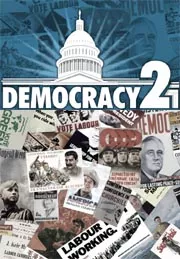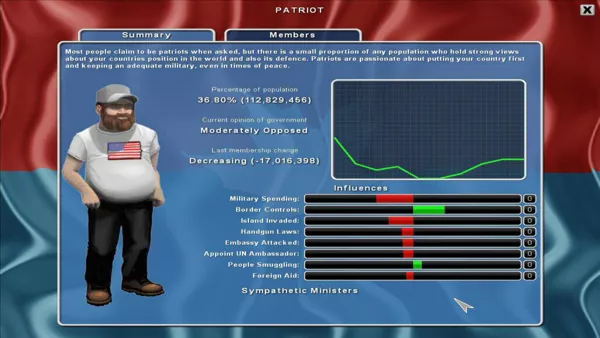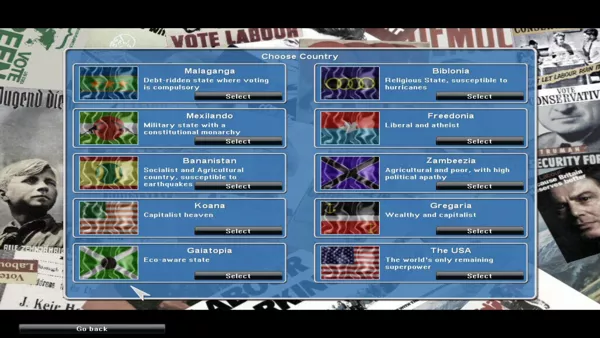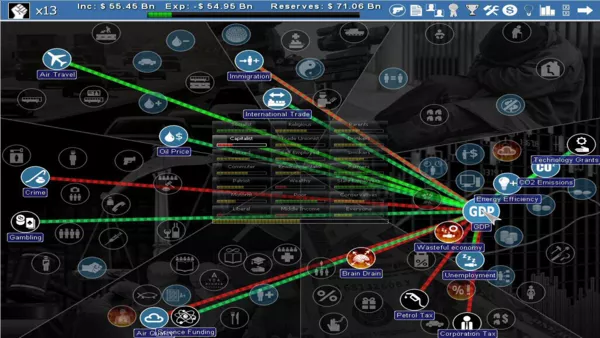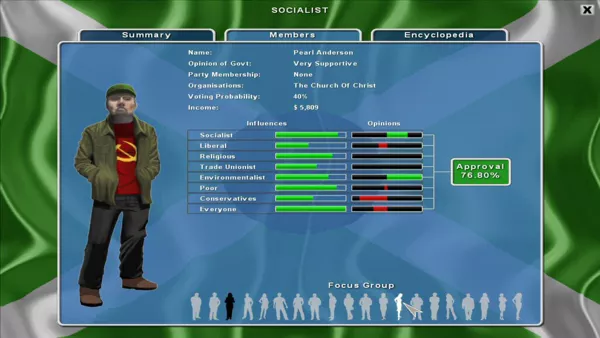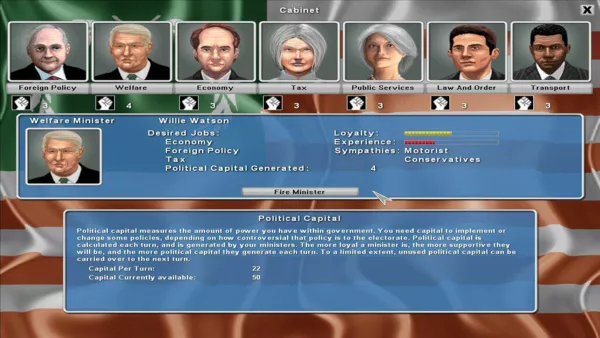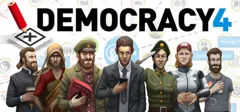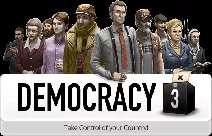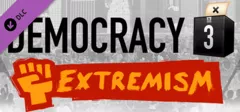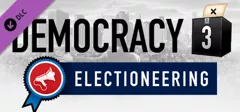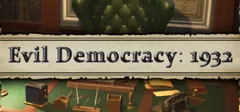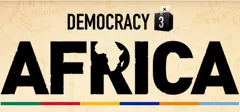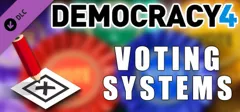Democracy 2
Description
Democracy 2 is a sequel to the political strategy game by the same developer. It's a turn-based 2D icon-driven game where the player is the president or prime minister of a virtual country, and has to take political decisions each turn in order to both solves the problems that the country has (and make it more prosperous) whilst keeping all of the voters in their different groups happy with the government.
Each turn in the game represents a single quarter (three months) and the term length, and the limit of terms you can serve are both selectable at the start of the game. You can end the game in several ways, either by winning all the elections and serving till the end of the term limit, by losing the vote at an election, by being assassinated or thrown from office in some other way by terrorist groups, or by reaching a rep-set 'debt ceiling'.
The main instrument of player control in the game is a 'policy'. A policy is basically a law or some government program, with a single 'slider' used to adjust the 'intensity' of that policy. This could be the tax rate in the case of tax policies, or the amount of budget allocated to a spending policy such as state education.
Democracy 2 introduced new features to the game in the way of ministers, who control the different government departments. Ministers gain experience over time, and their skill is a factor in determining the success of your policies. They can also be used to boost support from different voter groups depending on their support 'base'. Another new feature is the 'focus group' which is a graphical method of looking at individual voters in the game, and seeing their group membership, party affiliations and their likelihood of voting at the next election.
Groups +
Promos
Videos
Add Trailer or Gameplay Video +1 point
See any errors or missing info for this game?
You can submit a correction, contribute trivia, add to a game group, add a related site or alternate title.
Credits (Windows version)
5 People
| Character Artwork |
|
| Logo |
|
| Music | |
| Everything else |
Reviews
Critics
Average score: 74% (based on 9 ratings)
Players
Average score: 2.8 out of 5 (based on 7 ratings with 1 reviews)
Disappointing budget-manipulation game
The Good
This is not a game for screenshots. The government is a blank field, your policies and problems represented as blobs with coloured lines to show how they interact with each other. As such it is completely accessible, at least technologically (see below). This paragraph may be short but it’s a very positive point. I approached this game WANTING to play something plain and obvious. Any pyrotechnics or quick-time events would just get in the way.
Best part of the game? The encyclopaedia next to some of the policies, showing your amount of spending compared to other countries. Also there are some nice little quotes on the loading screens like you see in Total War games. Go team education!
It only crashed a few times, but other than that it loads quickly and is unlikely to make anyone’s hardware sweat, unless you’re playing it on an abacus or something made of papier-mâché.
The Bad
Your only influence on events is by caressing each with the magic wand of money. Terrorists? Spend more on army. Contagious diseases? Spend more on hospitals. If this system actually worked then Britain’s NHS would be the dispenser of immortality and head transplants. The voting public is motivated solely by how you swing that budget slide.
Nowhere is the influence of the media, or the ability to simply announce plans, or to give speeches and make public appearances, or crucially to even know what the hell your opposition party stands for! They function simply as a liquid mass that completely encapsulates everyone that doesn’t vote for you. “The President has raised income tax by 1%! We say, er, DON’T increase it by 1%.” “The President has cured the typhoid epidemic! Vote for us to reinstate delirium, septicaemia and uncontrollable diarrhoea for all!”
That this game is just a mechanism to manipulate is hardly a criticism. All games are such. But Democracy 2 is such a stale, blank system. It doesn’t matter if you play as America or The Great and Bountiful Curly_mcdommunist Empire™, you’re pretty much implementing the same policies to counter the same problems. Lower your military budget? A previously unknown colony of yours is invaded and you frequently suffer assassination attempts.
Someone’s example in the forums for winning an election went as follows:
1) Promise to cut tobacco tax 2) Completely cut tobacco tax, thus creating a huge population of smokers 3) Win election 4) Install a massive tobacco tax, thus gaining a huge amount of revenue
This is literally the game summarised in a few mind-bogglingly insane steps.
The game revolves around winning elections. So why do I start each game with a 16% approval rating? Are there any examples of a democratic government reaching a 16% approval rating and then clawing up into winning the next election through budgetary spending alone? Why can’t I have a repeat of the presumably PR-based election between 5000 political parties that got me into power at the start?
I like the random global events that crop up, including the appearance of a global recession, which is naturally hardwired to occur if you play as America. But again you have no way of reacting to these events apart from cutting budgets.
I had a high approval rating and was making a good stab at paying off my debts when recession struck. I immediately suffered a massive popularity drop from capitalists and businessmen when it hit. What, it was MY PERSONAL fault?? There’s nothing apparent in the mechanics of the game that would lead to the recession, it’s just an arbitrary penalty that appears out of nowhere, thus making it nearly impossible to fix because it’s not a goddamn tangible thing.
While I’ve mentioned the principles of balancing how different policies affect each other, there’s a surprising amount going on behind the scenes that isn’t presented to you visually. Example: I’m currently suffering from organised crime. Everything indicates that intelligence services negate the organised crime “level”. I increase the intelligence service budget until I have a literal “spy satellite network”. Nothing happens. Or at least, eventually, very very little happens.
So maybe there’s a wide series of causes for the prohibition-level of mooks and gangbangers on every street corner, presumably lack of education or poverty (neither of which were much of an issue for my government). If so, why does nothing SHOW me these links? Or, to take it the other way, why DOES it show me one link and not all the others?
Oh and that all-important approval rate bar you’ve been staring at? Turns out you can go into the election with a 70% approval rating and get 30% of the vote because you promised to reduce crime by 20%, but actually reduced it by 19%. Even the Daily Mail would have headlines of “Holy Shit! A 19% reduction in ALL CRIME during a recession with rioting on the streets and a massive cholera epidemic!”
Oh and the music was repetitive. It’s been stuck in my head during the writing of this review. Duhhhh duhh duh duh duh… DUHDUHHHH Tingaling
The Bottom Line
Why disappointing? I had high hopes for this game; particularly as management games generally revolve around the acquisition of resources rather than actual government. The forums surrounding the game are bubbling cauldrons of admiration for the game, and the creator has gone as far as sending copies of it to politicians, snidely remarking that none have given it a go.
I should bloody well hope they haven’t. Anyone describing this game as an accurate portrayal of governance is a liar. I confess that it is the above anecdote that has made me so pissed off and is the basis (that and the title of course) of how I've reviewed the game: as a simulation of government election campaigns.
What this game IS is a start. A mechanic. The creator has mentioned that he’s working on further iterations of the series. Were this game to be a single component of a larger, more ambitious game then there would be no worry. Taken at face value it is a perfectly functional game about slider moving.
Windows · by Curlymcdom (44) · 2009
Trivia
Freedonia
One of the many nations a player can choose to lead in Democracy 2 is Freedonia, a liberal, atheist state with a flag bearing a passing resemblance to that of Canada. This may be a reference to the 1933 Marx Brothers film, Duck Soup, which features a small, fiscally failing European nation which bears the same name. This allusion might be unintentional, however, as Freedonia has since become an English language term for a fictitious or remote and insignificant country.
Analytics
Upgrade to MobyPro to view research rankings!
Related Sites +
-
Democracy 2 for Mac
The Mac Gamer's Alex McLarty and Conor McArdle review the Macintosh version of Democracy 2 in the form of a back-and-forth conversation between the two of them (Feb. 4th, 2009).
Identifiers +
Contribute
Are you familiar with this game? Help document and preserve this entry in video game history! If your contribution is approved, you will earn points and be credited as a contributor.
Contributors to this Entry
Game added by cliff harris.
Macintosh added by Zeppin.
Additional contributors: Zeppin, Patrick Bregger.
Game added January 1, 2008. Last modified July 16, 2023.
